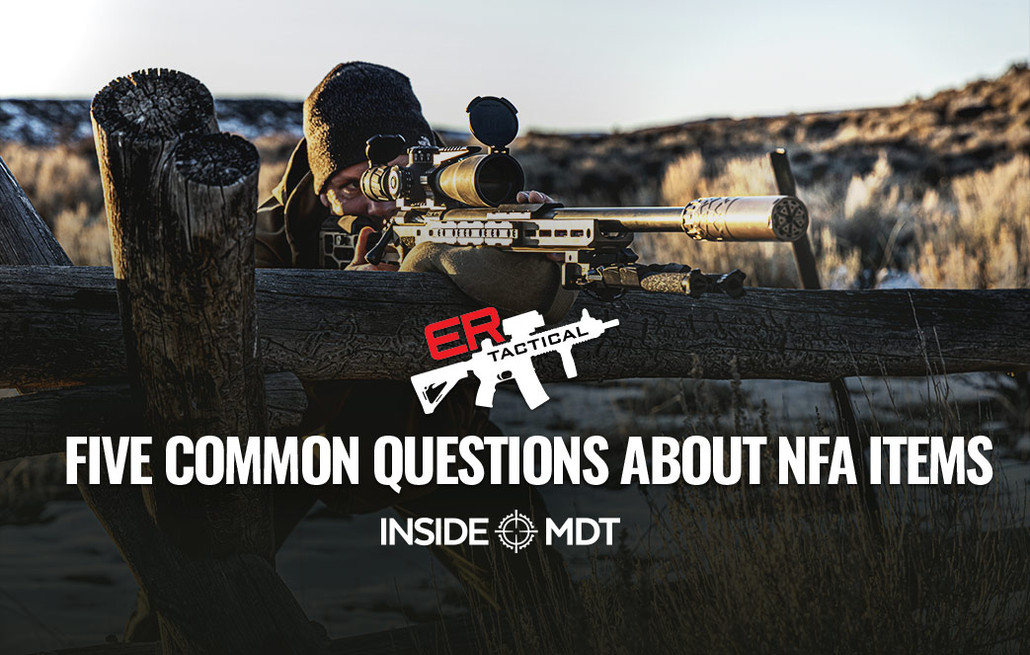Posted by Rob Orgel on 2024 Apr 11th
Five Common Questions About NFA Items - Inside MDT
Editor's Note—This article applies only to United States laws concerning NFA items like Suppressors/Silencer, Short-Barreled Rifles, Short-Barreled Shotguns, Any Other Weapons, and Machine Guns. If you have specific questions about NFA laws, please consult the appropriate legal counsel.
Whether you’re thinking about purchasing a suppressor for your next hunt, competition, or range day or you’re a suppressor connoisseur with a collection of stamps for all flavors of NFA items, here are the things you need to know to cover your six legally in regards to responsible ownership of your NFA items. In this article, I interviewed Derek Debus, an NFA attorney who works at Stone Rose Law in Scottsdale, Arizona. Here are the top 5 things you need to know about owning an NFA item.
Rob Orgel: If I get a suppressor, can the ATF come to my home, as I have given up some of my rights?
Derek Debus, Esq. : This is, unfortunately, a pervasive myth in the NFA community. The bottom line is that lawfully owning an NFA item does NOT suspend your Fourth Amendment rights. ATF, nor any other law enforcement entity, can search your home absent a warrant (or, in some cases, probable cause and exigent circumstances). Lawfully owning an NFA item does NOT give ATF carte blanche to inspect your home, firearms, or anything else – whether you own a suppressor, short-barreled rifle or shotgun, destructive device, or machine gun.
Rob Orgel: What do I need to keep with me when using or transporting an NFA item?
Derek Debus, Esq. : Technically, you don’t necessarily need to keep anything with you. However, given the unique nature of NFA items, their possession may arguably give a law enforcement officer reasonable suspicion to contact you to determine the legality of the NFA items. Thus, I always recommend that my clients keep their approved Form 1 or Form 4 and their LLC or Trust documents if they possess the items through an LLC or Trust. If you received a physical copy of the tax stamp, it certainly doesn’t hurt to keep that on you as well! Typically, I advise clients to take their documents to a print shop and have them “shrunk down” and laminated so they can stay in their range bag.
Rob Orgel: Is there any special way I need to store an NFA item?
Derek Debus, Esq. : With NFA items in particular, it is important to safeguard them against other’s actual or constructive possession. While all firearms should be locked in a secure safe when not in use, this applies even more so to NFA items. For example, if you own your NFA items as an individual and you live with others, you will want to secure it in a safe that your roommates do not have access to so that they are not in “constructive possession” of the item.
Rob Orgel: What is the difference between a Trust and an Individual when filing for my stamp?
Derek Debus, Esq. : When purchasing an NFA item as an individual, only the individual or those under their direct supervision may possess the NFA items. Thus, if you purchase your suppressor and leave it unsecured where your roommate may obtain it, your roommate is arguably in constructive possession of the suppressor and potentially committing a federal crime. Through a trust, however, you can add your roommate as a trustee (assuming they are not a prohibited possessor), and they may possess the suppressor legally. Simply put, a trust is a more flexible means of owning NFA items.
Rob Orgel: What happens if I choose to move homes?
Derek Debus, Esq. : If you are moving homes within the same state – nothing. If you are moving between states, you must notify the ATF and receive permission to transport the NFA item via ATF form 5320.20. This DOES NOT apply to suppressors – you do not need to notify the ATF if you move states with a suppressor. However, any other NFA item, such as short-barreled shotguns/ rifles, destructive devices, or machine guns, MUST have an approved ATF Form 5320.20 prior to transporting them out of the state in which they were registered.
Suppressors are a very common NFA item and are a great addition to a precision or hunting rifle.
CLOSING REMARKS
Rob Orgel: Thank you for taking the time to educate us on these critically important legal aspects of NFA legalities. As we conclude the interview, is there anything else the American NFA owner should know? Should we need an attorney in regard to firearm incidents or NFA problems? How can we get a hold of you?
Derek Debus, Esq. : NFA items have long received a bad rap in the firearms community because of their perceived difficulty in obtaining them. However, I would encourage every firearms owner to consider the value in not only normalizing NFA items in their local gun ranges and communities but also (in the case of suppressors) the additional safety of having a suppressor. The ATF has reformed the way they process NFA items, resulting in MUCH faster approval times than in the past. Having a suppressor, in particular, makes shooting safer and more enjoyable – and is a great way to introduce new folks to the joy of shooting sports. So, be a good firearms ambassador, get a suppressor, and take your anti-gun friends shooting!
My firm is Stone Rose Law, located in Scottsdale, Arizona. We provide nationwide defense of FFLs before the ATF and are one of the premiere firearms law firms in the State of Arizona. If anyone reading this ever finds themselves in need of an attorney, give us a call at (480) 498-8998 or online at www.stoneroselaw.com
Check out our recent guide on mitigating fire, accident, and theft.
More articles from Rob Orgel of Emergency Response Tactical
- Long-Range Hunting and Shot Placement
- Eye Dominance and Handedness Maximizing Speed and Efficiency
- Are You Ready for Your Hunt?
- Combat Readiness Regaining Mental Balance
- Bullet Expansion for Rifle Hunting
- Three Biggest Dangers During a Hunt
ABOUT THE AUTHOR
Rob Orgel enlisted in the USMC in 2004 as an Infantry Rifleman (0311), serving with 3rd Bn 1st Marines in Iraq, including roles as a point man in OIF-3 & team leader in OIF-6. Later, he joined the 1st Marine Regiment, achieved the rank of Sergeant in 2010, & continued service in Afghanistan. Upon returning, he became a Combat Instructor at the School Of Infantry West. Transitioning to private military contracting with Securing Our Country (SOC), he instructed at the American Embassy in Iraq. In 2018, Rob became Chief Instructor at GPS Defense Sniper School, revamping their program. Now, as owner & lead instructor at Emergency Response Tactical, he focuses on training novice to advanced shooters on the range over 300 days a year.


 CAD
CAD
 Euro
Euro
